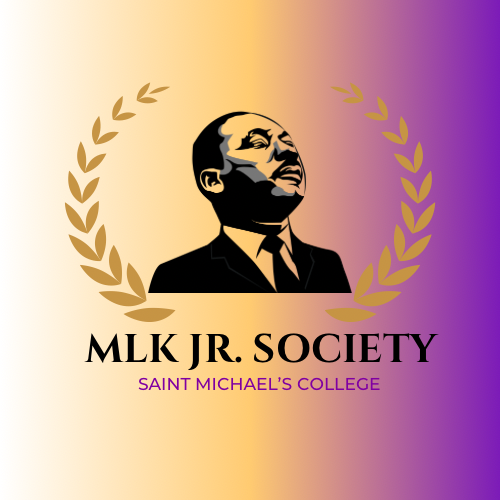Common text talk by Ung asserts common humanity
Months before the Hollywood-movie version of her epic survival story is scheduled to hit Netflix later this year, alumna author Loung Ung ’93 elegantly shared that tale and more with hundreds of Saint Michael’s College first-year students on Monday night, Aug. 29 in McCarthy Arts Center — in real-time on the big screen, via a live-streamed video remote.
The special interactive program, which packed nearly every seat in the recital hall, related to this year’s choice of Ung’s 2000 book “First They Killed My Father” as the Common Text for Saint Michael’s first-year students.
First-year Seminar director Peter Vantine of the modern languages faculty, who organized and hosted Monday’s program, said although Ung’s book has been proposed in prior years as a Common Text, the timing finally was perfect this year given the prominent and ongoing refugee crisis in the modern world that relates closely to the book’s themes.
Also, Ung’s book about enduring Pol Pot’s genocidal regime in Cambodia as a little girl soon will be told in a film directed by Hollywood A-lister Angelina Jolie for Netflix. Release is scheduled for this coming November. The author told her Saint Michael’s audience how interesting it has been to see the screenplay that she co-wrote with Jolie coming together as a film.
Ung spoke from Public TV studios in Cleveland, OH, where she now lives and is a founding partner of some restaurants. Throughout her spirited hour-and a half of good-natured and personal give-and-take with the students, she and they kidded and laughed about common Saint Michael’s experiences, but her audience sat at riveted and solemn attention when she described coming through nearly unfathomable hardships and horrors in her younger life: wrenching final partings, the loss of family members to murderous regime purges, being taught as a child to be a killer (though never having to be one thankfully), thousands of mass graves in her homeland when she finally returned, a full fourth of the population murdered in a land the size of Oklahoma, and so many countrymen with limbs blown off or killed by mines even after the war was over. And most of that happened over four years, “the span of your college years.”
Ung spoke informatively later about becoming a writer and the hard process of writing; also, about her later life’s mission to rid the world of landmines; about the imperative of choosing to make a difference in the world; and about her gratitude that, despite everything she has seen and experienced, “beauty still stops me in my tracks.”
Ung also told them how much Vermont and Saint Michael’s have meant in her life since she came to Essex Junction as a church-sponsored refugee at age 10 knowing only three words of English – “hungry,” “food” and “thank you.”
Her book was an award-winning national bestseller and translated in numerous languages, Vantine said in his introduction. In 1980, Ung with her siblings escaped Cambodia to a refugee camp in Thailand before Holy Family Church in Essex and the U.S. Catholic bishops sponsored her and some siblings to come to Vermont. After graduating as a political science major at Saint Michael’s, Ung was an activist at a Maine women’s center and later returned many times to Cambodia once the Khmer Rouge was deposed to find family members to reunite, gathering impressions, interviews and other material for her books. Her second book Lucky Child (2005) recounted reuniting with her sister. Learning of the devastation of land mines, she made that her next cause, “the change I wanted to make,” and she joined the group Campaign for a Landmine -Free World, moving to Washington, D.C.
Ung told students that for her, writing started as journaling that was therapeutic when she was young and had nobody to talk to, but soon it was all the time.” Questioned later about writing in general, Ung said, “It’s boring after a while writing about yourself – you’ve got to take it outside of yourself.”
She told students how she took to heart advice she once had heard to “write with your five senses.” First-year seminar instructor Richard Kujawa of the geography/economics faculty said he was most impressed that throughout her talk, Ung emphasized how writing is a hard process of editing and attention to detail and choosing the proper voice and thinking of the audience and painstakingly gathering information – that her words didn’t just flow effortlessly as students might have imagined when reading the book, even if that seems to be the case in the polished finished product.
A challenge in her life, she said, has been coming to terms with rage and hate that grew over “three years, eight months, 21 days” before her escape to a refugee camp, of being told what to do and wear, and later regret at not speaking up earlier when what seemed like inconsequential rights early on were taken away; then, the rapid descent into violence for so many people, followed by the effort that goes into staying alive on a daily basis in such circumstances. “To survive takes work,” she said. Her nature, she confessed, is to “go more to the dark side” as an angry fighter, but “I had to choose to make a difference on a daily basis” with an attitude of optimism and hope instead. Her book, she said, was “born of a desire to tell the world a love story”– about a mother’s love and the love between sisters.
In 2002 Ung was inducted into the Saint Michael’s College Alumni Academic Hall of Fame, and she previously has addressed graduating class at the College, though never an incoming class, Vantine noted.
“This is my very first video event speaking to an audience,” she said as her image came on the screen at start of the event, to opening cheers, “so bear with, me. It’s really cool to be here – I wouldn’t do it with anybody else, but with Saint Michael’s I’m really thrilled, because it’s such a great community, such a phenomenal school, — you will have a wonderful time in the next four years!”
She remembered arriving herself as a first-year student, “nervous and excited, and I fell in love with the school.” Friends she made as a student “continue to challenge and support me with everything I wanted to do in life. . . I’ve been so blessed…..it was really at St. Mike’s that I was introduced to a community of curious intellectuals, searchers and travelers, learning to think globally and want to make change,” she said.
On the Saturday before Monday’s program, students attended a panel discussion with three faculty answering questions about the text. The questions, Vantine said, were “outstanding’ from the first-years, most of whom already have read the book before arriving last week. “A number of them challenged the faculty panelists a little, and we were excited and invigorated to see they were asking good questions and had been moved by the text – and were not shy about expressing themselves in that public forum so early in their academic careers, even before their first day of class,” he said.
Ung told of her own crippling nervousness as a Saint Michael’s student decades ago when it came to speaking to groups — a fear she radically tried to overcome by volunteering one time to teach people how to dance during a “Mister Saint Michael’s” pageant, even though she didn’t know how to dance, she recalled. “It didn’t work!” she said to laughs. Still, she continued to speak to groups frequently despite her nerves, choosing to do what needs to be done to achieve her life’s larger goals.
It was an example that advanced her overriding message for the first-year students – such as the woman who who asked during the question-answer session what they can do to help with some of her causes, like landmine eradication.
“There’s a lot of good people doing good work,” Ung replied. “Your job as a student is to pay attention to your heart strings — and what vibrates them, even when you go to sleep.”
“We only have to choose and act on it,” she said.





